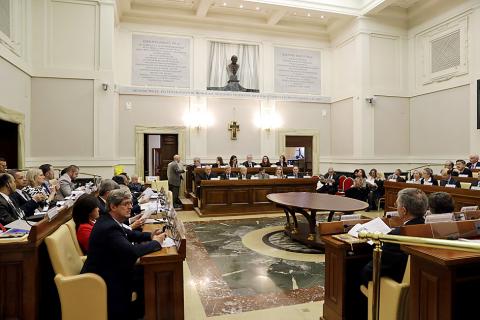Participants at a Vatican conference on organ trafficking on Tuesday challenged China to allow independent scrutiny to ensure it is no longer using organs from executed prisoners, saying Chinese assurances are not enough to prove the transplant program has been reformed.
Sparks flew in the afternoon session of the meeting as former Chinese minister of health Huang Jiefu (黃潔夫) sought to assure the international medical community that China was “mending its ways” after declaring an end to the prisoner harvesting program in 2015.
“I am fully aware of the speculation about my participation in the summit,” Huang told the conference, citing “continuing concerns about the transplant activities.”

Photo: AP
However, he provided scant data to rebut critics, showing only two slides indicating an increased number of living and deceased donors in recent years and China’s recent efforts to crack down on black-market transplant activities.
Huang first publicly acknowledged the inmate harvesting organ program in 2005 and later said as many as 90 percent of Chinese transplant surgeries using organs from dead people came from executed prisoners. He has spearheaded a reform effort and pledged that China put an end to the program in 2015.
However, doubts persist that China is meeting its pledge, given its lack of transparency, the severe shortage of organ donors and China’s longstanding black-market organ trade.
Huang’s colleague, Haibo Wang, stressed the sheer impossibility of trying to fully control China’s transplant activity since there are 1 million medical centers and 3 million licensed doctors operating in the nation. As a result, China proposed at the Vatican meeting that the WHO form a global task force to help crack down on illicit organ trafficking.
Jacob Lavee, president of Israel’s transplant society, said the WHO should be allowed to conduct surprise inspections and interview donor relatives in China.
“As long as there is no accountability for what took place ... there can be no guarantee for ethical reform,” he told the conference in a heated exchange.
He was joined by Gabriel Danilovitch, from the UCLA Medical Center, who challenged the Chinese delegation to declare straight out if prisoner organs were no longer used.
Wang countered that he and Huang spent the past 12 years battling critics inside China and out to reform the sector, and said China should not be singled out for spot WHO inspections.
The back-and-forth underscored the controversy over China’s participation in the conference, after critics sent a letter to organizers and Pope Francis warning that Chinese attendance amounted to a Vatican whitewash of its past practices.
However, organizers stood firm in their invitation.
“Are they doing any illegal transplantation of organs in China? We can’t say,” said Monsignor Marcelo Sanchez Sorondo, chancellor of the Pontifical Academy of Sciences. “But we want to strengthen the movement for change.”

EXPRESSING GRATITUDE: Without its Taiwanese partners which are ‘working around the clock,’ Nvidia could not meet AI demand, CEO Jensen Huang said Taiwan Semiconductor Manufacturing Co (TSMC, 台積電) and US-based artificial intelligence (AI) chip designer Nvidia Corp have partnered with each other on silicon photonics development, Nvidia founder and CEO Jensen Huang (黃仁勳) said. Speaking with reporters after he met with TSMC chairman C.C. Wei (魏哲家) in Taipei on Friday, Huang said his company was working with the world’s largest contract chipmaker on silicon photonics, but admitted it was unlikely for the cooperation to yield results any time soon, and both sides would need several years to achieve concrete outcomes. To have a stake in the silicon photonics supply chain, TSMC and

‘DETERRENT’: US national security adviser-designate Mike Waltz said that he wants to speed up deliveries of weapons purchased by Taiwan to deter threats from China US president-elect Donald Trump’s nominee for US secretary of defense, Pete Hegseth, affirmed his commitment to peace in the Taiwan Strait during his confirmation hearing in Washington on Tuesday. Hegseth called China “the most comprehensive and serious challenge to US national security” and said that he would aim to limit Beijing’s expansion in the Indo-Pacific region, Voice of America reported. He would also adhere to long-standing policies to prevent miscalculations, Hegseth added. The US Senate Armed Services Committee hearing was the first for a nominee of Trump’s incoming Cabinet, and questions mostly focused on whether he was fit for the

IDENTITY: Compared with other platforms, TikTok’s algorithm pushes a ‘disproportionately high ratio’ of pro-China content, a study has found Young Taiwanese are increasingly consuming Chinese content on TikTok, which is changing their views on identity and making them less resistant toward China, researchers and politicians were cited as saying by foreign media. Asked to suggest the best survival strategy for a small country facing a powerful neighbor, students at National Chia-Yi Girls’ Senior High School said “Taiwan must do everything to avoid provoking China into attacking it,” the Financial Times wrote on Friday. Young Taiwanese between the ages of 20 and 24 in the past were the group who most strongly espoused a Taiwanese identity, but that is no longer

A magnitude 6.4 earthquake and several aftershocks battered southern Taiwan early this morning, causing houses and roads to collapse and leaving dozens injured and 50 people isolated in their village. A total of 26 people were reported injured and sent to hospitals due to the earthquake as of late this morning, according to the latest Ministry of Health and Welfare figures. In Sising Village (西興) of Chiayi County's Dapu Township (大埔), the location of the quake's epicenter, severe damage was seen and roads entering the village were blocked, isolating about 50 villagers. Another eight people who were originally trapped inside buildings in Tainan